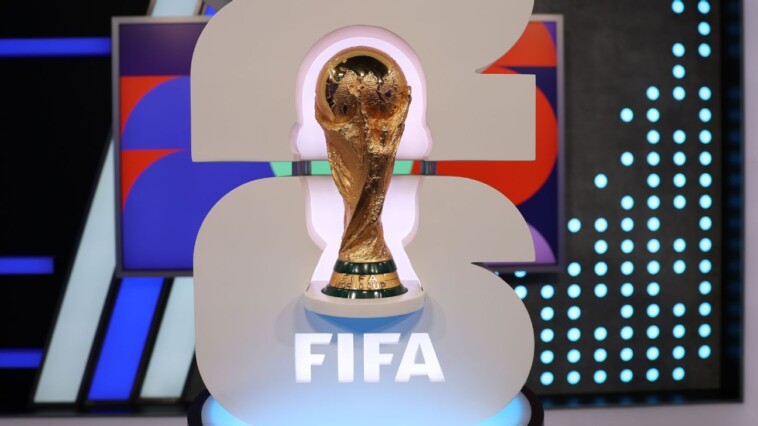-

Dale Johnson, General Editor, ESPN FCDec 10, 2024, 05:00 AM ET
European countries will find out their route to the 2026 FIFA World Cup in the United States, Mexico and Canada when the draw is made on Friday, Dec. 13.
Here’s everything you need to know about the qualifying campaign for the UEFA confederation.
When is the World Cup qualifying draw?
The draw will take place on Friday, Dec. 13. The time has yet to be confirmed.
What are the draw pots?
The eight teams who take part in the UEFA Nations League (UNL) quarterfinals (QF) were automatically placed in Pot 1, along with England, Belgium, Switzerland and Austria.
This is because the UNL QF winners must be in a group of four and have the international dates free in March and June.
As it turned out, the 12 teams in Pot 1 are the top 12 teams by FIFA World Ranking anyway.
All other pots are determined by FIFA World Ranking.
The UNL QF teams appear as winners of / losers of ties (more to come on this.)
How does the draw work?
It’s a little complicated, so stay with us.
Along with the eight teams who are in the UNL QFs from Pot 1 there are two, Austria and Belgium, who will play a promotion/relegation playoff (PO) in March. Only England and Switzerland will not need March free.
From Pots 2, 3 and 4 there are 14 countries are in the POs in March.
In the original draw regulations all teams who need to play POs were to be prioritised into a group of four. FIFA updated the regulations at the end of November to remove this clause. It was deemed unfair because PO teams in Pots 2, 3 and 4 were going to be forced into harder groups — potentially against UNL QF winners from Pot 1, and high-ranked fellow PO teams from the other pots.
It’s not such good news for the six teams in Pot 2 who do not need a PO, as the old regulations ensured they would go into a group of five and automatically avoid the four strongest countries as UNL QF winners.
This is what we know for certain at the start of the draw:
– The four UNL QF winners must go into a group of four
– A group of five can contain only one UNL QF losers or PO team.
The draw begins will all teams from Pot 1, through to Pot 5. The four-team groups (A to F) are filled first, subject to the draw conditions for UNL teams.
What else should we look out for?
Pot 1
England and Switzerland are not guaranteed to be in a group of five, but the likelihood is 75%. There are eight possible groups for them, and only two contain four teams.
Pot 2
Six non-PO: Sweden, Wales, Poland, Romania, Czechia, Norway
Six PO: Ukraine, Turkey, Hungary, Serbia, Greece, Slovakia
As a group of five can only contain one PO team, what happens to England and Switzerland is the deciding factor.
In the unlikely event that both England and Switzerland end up in a group of four teams, all Pot 2 PO teams will have to go into a group of four, and all non-PO teams in Pot 2 into a group of five.
If one of England and Switzerland are in a group of four, that would leave only one possible group of four for the non-PO teams.
If both England and Switzerland are in a group of four, it leaves two possible groups in a group of four for the non-PO teams.
Pot 3
Seven non-PO: Albania, Bosnia and Herzegovina, Finland, Israel, Montenegro, Northern Ireland, North Macedonia
Five PO: Scotland, Slovenia, Republic of Ireland, Georgia, Iceland
By the time we get to Pot 3 it’s possible all five-team groups will already have a PO team, which automatically places the five PO teams in this pot into a group of four.
Pot 4:
Twelve non-PO: Azerbaijan, Belarus, Cyprus, Estonia, Faroe Islands, Kazakhstan, Latvia, Lithuania, Luxembourg
Three PO: Armenia, Bulgaria, Kosovo
There’s even less chance that there will be a five-team group available to the three PO teams in this pot.
The UNL PO teams in Pot 5 will not play their ties until March 2026, so are unaffected for the World Cup draw.
How is it going to work for UEFA Nations League QF winners?
As the QF of the UNL are held in March, it won’t be known until then which four countries must have June free for the finals, and be in a group of four.
So the draw will have the QF ties as winners or losers placeholders of each tie, as shown in the pots.
It means eight World Cup groups will not know their Pot 1 opponents until March.
Quarterfinals
Netherlands vs. Spain
Croatia vs. France
Denmark vs. Portugal
Italy vs. Germany
What is the format of European World Cup qualifying?
There are 54 active nations in UEFA. The 55th, Russia, will not take part due to the ongoing war in Ukraine.
The 54 teams will be drawn into 12 groups — six will contain five countries, and six will have four nations.
When are the games played?
There are 10 international dates, in pairs in March, June, September, October and November.
Teams in a group of five will begin qualifying in March. However, if a five-team group contains a UNL QF or PO team, they must have the March dates off. Other countries will have two spare dates for international friendlies.
Teams in a group of four will start qualifying in September and the dates in March and June will be free for UNL QF, PO or international friendlies.
How many European teams qualify for the expanded World Cup?
Under the old format UEFA provided 13 nations. That increases by three to 16 for the 2026 edition.
How do teams qualify for the World Cup?
The 12 group winners go direct to the World Cup.
The 12 runners-up will go into the playoffs, joined by four teams from the last edition of the UEFA Nations League, to battle it out for the final four spots.
How do UEFA Nations League teams make the World Cup playoffs?
The 14 group winners from the 2024 edition of the UNL have been ranked from Nations League A through to League D. The first four UNL group winners who do not finish in the top two of their World Cup qualifying group will get a playoff.
The priority order for the four World Cup playoff places is:
Spain
Germany
Portugal
France
England
Norway
Wales
Czechia
Romania
Sweden
North Macedonia
Northern Ireland
Moldova
San Marino
Of the 14 teams to win their UNL groups, 10 of those are in Pot 1 or 2 for the draw — so on ranking would finish in the top two of their group. If that comes to pass, North Macedonia, Northern Ireland, Moldova and San Marino would get a playoff place.
If, after going through all the group winners, there are still playoff places available then it reverts to overall UNL League ranking — meaning it runs through the whole of League A rather than through all group runners-up.
How do the World Cup playoffs work?
Teams will be seeded on performance for one-legged ties, to be played in March 2026.
Pot 1: World Cup qualifying group runners-up with the best four records
Pot 2: As above, teams fifth to eighth
Pot 3: As above, teams ninth to 12th
Pot 4: UEFA Nations League teams
Semifinals:
Pot 1 vs. Pot 4
Pot 2 vs. Pot 3
The higher-ranked teams will be at home in the semifinals.
The winners will meet in the final, with a draw conducted in advance to determine which team is at home.
The winners of the four playoff finals qualify for the 2026 FIFA World Cup.


